Last year, Solaris maintained its position of prominent European producer of electric buses, and it generated record high sales. Alternative driveline vehicles constituted 36% of all those sold last year. In 2018, for the 16th time in a row, the company claimed the spot of leader on the Polish market of city buses.
In 2018, Solaris delivered in total 1226 buses and trolleybuses to customers in Poland and abroad. Of these, 402 went to Polish buyers. Thus, the company turned domestic leader on the market of low-floor city buses for the sixteenth time in a row, claiming a market share of 33%.
Chart: Polish market of low-floor city buses of GVW>8 tonnes in 2018, in percentage terms
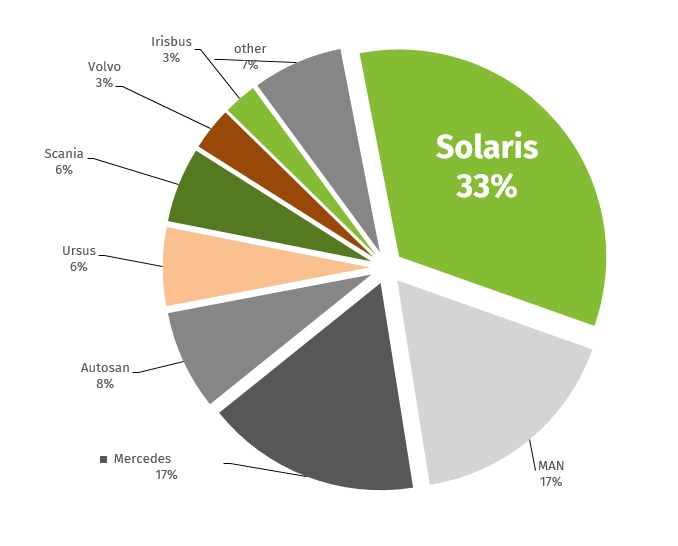
In fact, 2018 was an exceptional year for the whole bus industry in Poland. All in all, Polish bus operators were provided with 1195 buses, which translates to a market growth of 50% compared to 2017 (795 vehicles)!
Chart: Sale of buses of GVW>8 tonnes in Poland in 2018, in units, source Solaris/JMK Bus Market Analysis
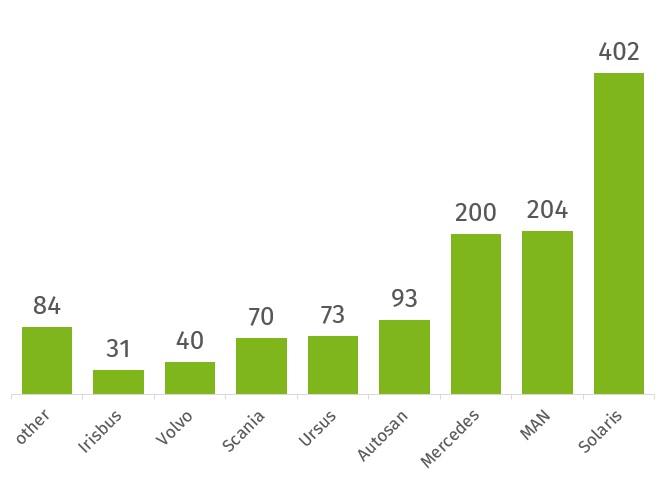
As for non-Polish customers, in 2018, Solaris supplied to them in total 824 vehicles, with most of these going to Lithuania (162), Germany (153), the Czech Republic (141), and Italy (113). The biggest orders completed by the company in 2018 involved supplies to: Vilnius (149 Solaris Urbino 12 and Urbino 18 buses), Rome (90 Solaris InterUrbino 12), Brussels (63 Solaris Urbino 12 hybrid), and Düsseldorf (54 Solaris Urbino 18).
It should be underscored that buses with alternative drivelines, in particular hybrid and electric ones, play an increasingly important role in the sales and product structure of Solaris. In 2018, a total of 36% of all contracts carried out by the firm entailed supplies of low-emission or zero-emission vehicles. In the period summed up herein, 107 battery buses were delivered to customers in Belgium, the Czech Republic, Spain, Germany, Norway, Poland, Romania, Slovakia, Sweden and Italy. Consequently, with a market share of 17%, Solaris was among the highest ranking European firms in the e-mobility segment. One should not forget that the Solaris Urbino 12 electric was crowned best city “Bus of the Year” in 2017.
Chart: Sales of electric buses in Europe in 2018 according to producers, in percentage terms, source: Solaris
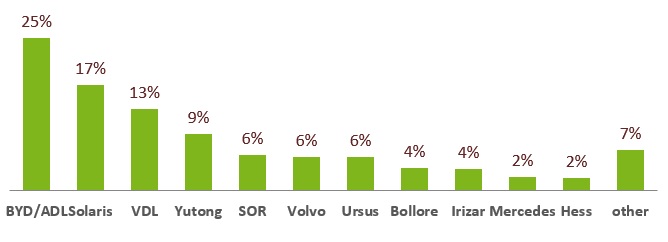
The rising significance of electric buses in the sales structure of Solaris is consistent with the long-term development strategy of the firm, as well as of the CAF Group which is owner of 100% of Solaris shares . CAF (Construcciones y Auxiliar de Ferrocarriles) is a Spanish company group with a history of over 100 years and listed on the Spanish stock market. The group is focussed in the design, assembly, maintenance and supply of transport solutions, especially on railway sector. It also deals in the latest solutions of buses for urban transport, including e-mobility. It is estimated that within the next decade the segment of low or zero-emission city buses will grow to account for 80% of the whole city bus market, mostly at the expense of conventional drivelines. Solaris is well prepared for this change and, within the next few years, buses with alternative drivelines will account for at least half of the output of the Company.
Chart: Projections for the share of alternative drivelines in the years 2020-2030 on the city bus market in Europe.
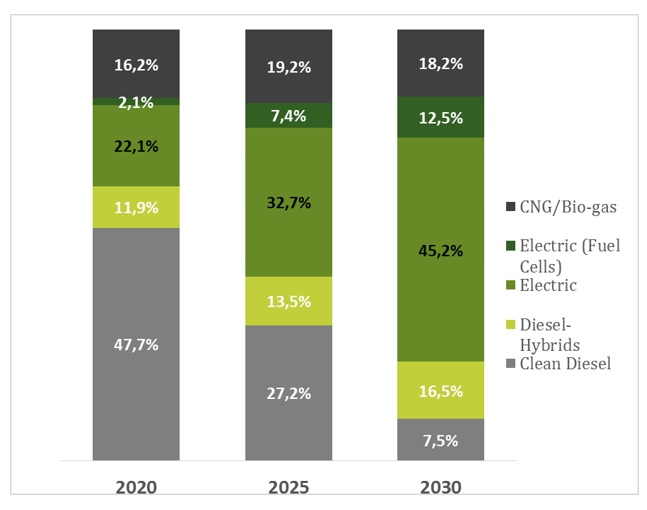
The company has seen a stable hike of revenue for several years now. 2018 was no different. In the past year, the total turnover settled at nearly PLN 1.9 billion.
Chart: Revenue of Solaris Bus & Coach S.A. in the years 2013-2018, in millions of PLN
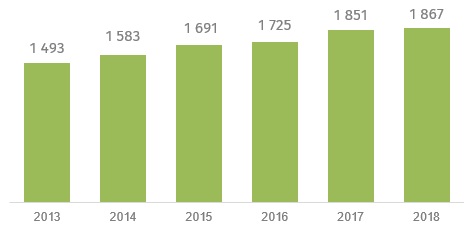
2018 saw several premières of Solaris products. During the Transexpo trade fair in Kielce, in autumn last year, the producer unveiled one of the latest additions to its offer, the Solaris Urbino 12 LE lite hybrid. The label “light” in the vehicle name refers to its biggest advantage, namely the low fuel consumption, which translates to reduced operating costs compared to similar vehicles available on the market. The general objective of the engineers in the Company's Office of Development, who had worked on creating the Urbino 12 LE lite hybrid, was developing a bus structure which would score a fuel consumption of less than 30 litres per 100 km in the Standardised On-Road Test 2 (SORT 2).
As of January this year, the new design is a standard for all newly manufactured buses. The Solaris Urbino buses post-facelift which premièred at the Transexpo fair also yield tangible benefits to their users.
- The new front lighting system is based fully on LED technology. The five headlights (main-beam headlamp, dipped-beam (passing) headlamp, fog lamp, direction indicators and position lamps) of the bus have been replaced by three headlights.
- The new design of the bus front improves the driver’s field of vision.
- The new shape of the front wall means a more optimal aerodynamics of the bus.
- A changed shape of the roof guards means a more effective assembly and simpler maintenance as well as better drainage of water from the bus roof.
- The visibility of the front destination display for passengers has been enhanced.
As for 2019, Solaris is going to release two product débuts this year. The first of these will be the Solaris Urbino 12 hydrogen The première of the 12 metre long bus with an electric driveline and a hydrogen fuel cell as range extender has been slated for June 2019, during the Public Transport Summit in Stockholm. It will be the first Solaris bus that runs on hydrogen and is 12 meters long. The manufacturer has applied the latest technological achievements on the market as regards components for hydrogen storage and power generation (composite tanks to store type IV hydrogen and a hydrogen fuel cell of the new generation).
The second vehicle, whose début has been scheduled for the Busworld trade fair in Brussels in October, is the Solaris Trollino 24. The trolleybus under construction is the first bi-articulated vehicle with two drive axles and an oversize length of 24 metres in Solaris’ history. Ultimately, it will constitute a construction platform for trolleybuses, as well as battery and hybrid buses.
“We enter 2019 with ambitious targets and large number of secured orders for this year. Crucially, a significant part of these vehicles feature alternative drivelines in the design and production of which Solaris is now a European expert. We also attach great importance to after-sales services offered to our customers and focus on the development of that segment. With each year we face new challenges born of expectations of the market with regard to innovative solutions. However, Solaris is an organisation perfectly prepared for that task and it is able to both respond to the needs of its customers, and create new market trends, in particular with regard to e-mobility,” Javier Calleja, CEO of Solaris, sums up the company’s plans for 2019.
Information Solaris
Additional information
Mateusz Figaszewski
Institutional Partnerships and External Relations Director
mateusz.figaszewski@solarisbus.com



















